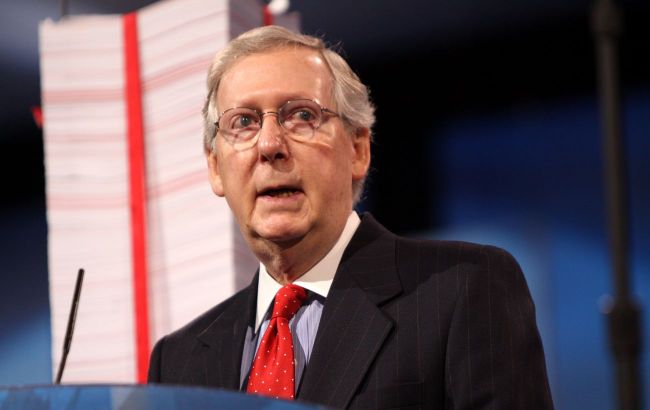U.S. Senate to consider funding agreement for Ukraine next week
 Photo: Senate Republican Minority Leader Mitch McConnell (Wikimedia)
Photo: Senate Republican Minority Leader Mitch McConnell (Wikimedia)
Leader of the Republican minority in the Senate, Mitch McConnell, expects that senators will consider a bipartisan agreement on funding for Ukraine and border security next week, according to The Hill.
In his words, the agenda of the Senate is controlled by the Democrats. However, he is confident that the participants in the negotiations will announce the agreement on border security in the next few days.
"My assumption is we’re likely to be on that in the Senate next week," McConnell said.
Republican Party leaders note that the stumbling block remains the divergence on President Joe Biden's authority for conditional early release of migrants detained at the southern border of the country.
At the same time, according to McConnell, Republican lawmakers should not miss the opportunity to pass a package of laws aimed at addressing threats to national security, reforming asylum legislation, and the administration's powers regarding the deportation of migrants from the country.
"This is a unique opportunity to accomplish something in divided government that wouldn’t be there under unified government," said the leader of the Republicans in the Senate.
McConnell also acknowledged that the Biden administration and Senate Democrats will have to compromise on the issue of conditional early release of undocumented migrants but expressed confidence that both sides will ultimately find a compromise.
"We’re hoping to get a credible border package. I anticipate that will be before us next week," he said.
At the same time, McConnell did not rule out that even if Republicans gain control of the White House, the Senate, and the House of Representatives after the 2024 elections, they will likely be unable to carry out border security reforms, as Democrats will block them in the Senate, where 60 votes are needed to pass most laws.
The deal is closer than ever
Senate Majority Leader Chuck Schumer supported McConnell's optimism about reaching a deal soon, stating, "We are closer than we have ever been."
"For the first time, I’m optimistic. For the first time, I think the chances of getting it done in the Senate are greater than not getting it done," he said, adding that "this is good news."
According to Schumer, Senate Democrats gave their chief negotiator, Senator Chris Murphy, "rousing applause" for bringing the package closer to the conclusion of the negotiations.
"Passing the supplemental is one of the hardest things the Senate has done in a long time but we got to finish the job. Ukraine is already suffering from a lack of armaments and if Ukraine folds we’re going to be suffering the consequences, not for months, but for years to come," he said.
At the same time, McConnell acknowledged that Senate Republicans are unsure whether any bipartisan agreement can pass through the House of Representatives, where Republican Speaker Mike Johnson is under constant pressure from conservative colleagues.
"I don’t know what the House will do. We’re working on trying to get a package out of the Senate that deals with national security and border security in a credible way," McConnell said.
The package will include over $60 billion in aid for Ukraine, $14 billion for Israel, and $14 billion for border security and protection from migrants arriving in the country from the South.
Problems with the approval of U.S. financial aid for Ukraine
Over the past few months, a political war has erupted between Democrats and Republicans in the U.S. House of Representatives and Senate over a bill providing financial aid to Ukraine and other allies.
At the end of October, over $5.4 billion remained in the U.S. for military aid to Ukraine.
On October 20, 2023, U.S. President Joe Biden submitted a bill to Congress proposing $106 billion in aid to Israel and Ukraine, as well as strengthening the defense-industrial complex. Of this amount, $61.3 billion was proposed for Ukraine and $14.3 billion for Israel.
However, on December 6, the Senate blocked the start of debates on this document. Senate Republicans refused to support the bill, demanding that the White House include more radical proposals for securing the U.S.-Mexico border in the document.
On January 12, the White House announced that financial aid to Ukraine is suspended until Congress approves a new funding package.

